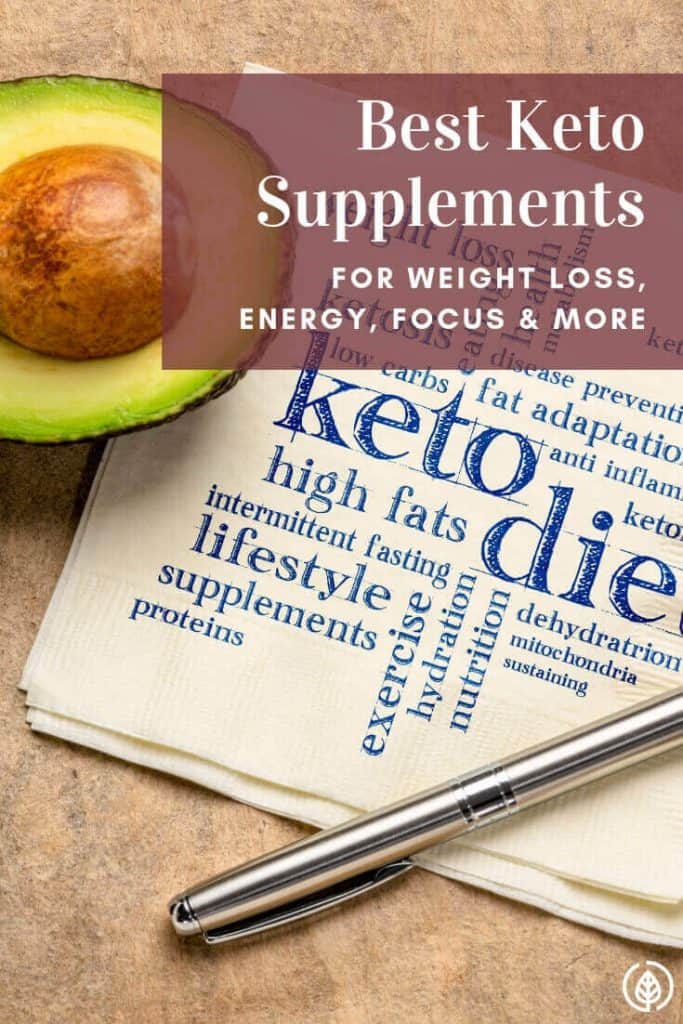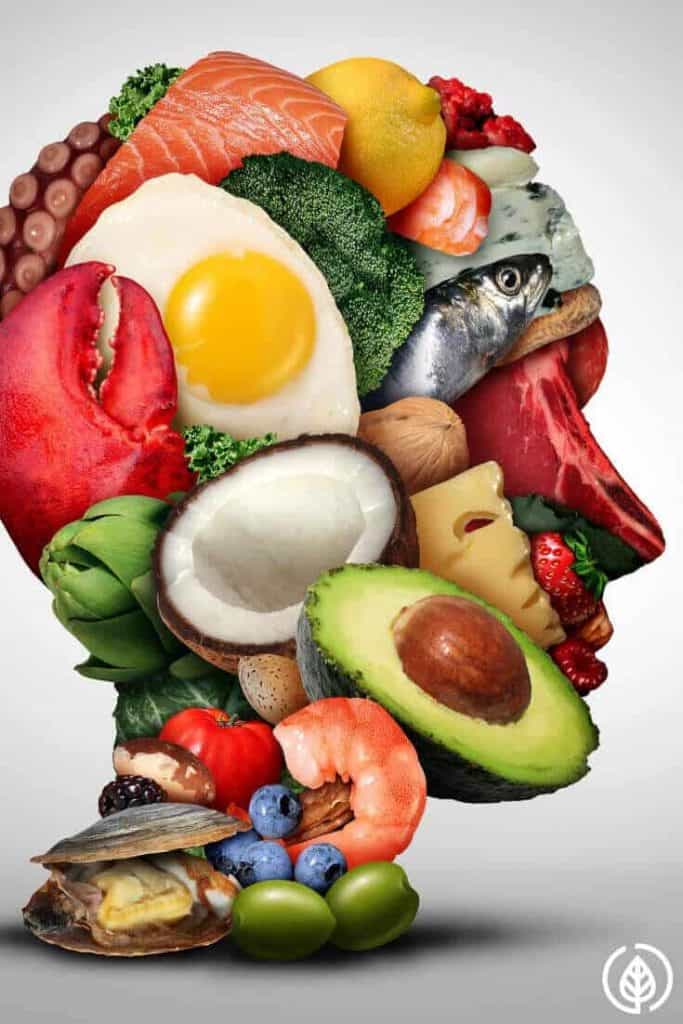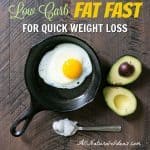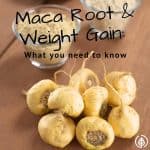There are many health benefits to eating a low carb diet. But for some people, it’s hard to stick with. Fortunately, some of the best keto supplements make it easier for the body to get into ketosis.

What Are The Best Keto Supplements?
Well, that answer depends. Are you following a ketogenic diet? Or, do you want to get into ketosis an easier way?
If you are following a strict keto diet, some of the best things to take are:
- MCT oil
- Electrolytes (one excellent source is cream of tartar)
- Digestive enzymes
But let’s say you have no intention of limiting your net carbs to 25-50 grams per day. Only when pigs fly will you give up pasta. (If that’s the case, consider trying zero-carb shirataki noodles.)
If that’s the case, is it possible to benefit from keto supplements? Not only that, but is there a way for your body to get into ketosis? (Ketosis is when your body burns fatty acids called ketones as its primary source of energy instead of sugar.)
Let’s answer the first question. Yes, even if you’re not eating a low-carb/high-fat (moderate protein) diet, you’ll still benefit. MCT oil, digestive enzymes along with omega-3 fatty acids are good for just about everybody.
As for the second question, yes, it is possible to get into ketosis even if you’re not following a strict ketogenic diet.
And the way to do that is by taking something called an exogenous ketone supplement.
What are Exogenous Ketones?
Usually it’s a powder you mix with liquid, that contain ketones. (Exogenous means external.)
Eating a low-carb, high-fat diet eventually gets you into ketosis. But it can take up to several weeks for that to happen. This is because if you’re new to a keto diet, it can take that long for the body to get used to making the fuel switch from carbs to fat.
However, exogenous ketones can take as little as an hour for the body to start using these fatty acids for fuel.
Do Keto Supplements Work And What Are The Benefits?
Focusing on exogenous products, yes, they may be helpful for a variety of reasons.
Studies (like this one) conclude “exogenous ketone drinks are a practical, efficacious way to achieve ketosis.”
More and more research is being done on the benefits of ketosis because of the growing interest in keto diets. Although the research is in its infancy, relatively speaking, evidence suggests getting into ketosis may:
- Protect the brain
- Improve memory, focus and concentration
- Heal the brain from injury
- Balance blood sugar and insulin
- Normalize the hunger hormones leptin and ghrelin
- Improve thyroid and sex hormone function
- Regulate inflammation
- Increase lean muscle
In the short term, ketones may help you achieve more energy and cognitive benefits. And in the longer term, ketones can help improve your body composition and lower inflammation.
Keep in mind that everybody is different and there are some side effects. Even the high-quality exogenous ketones can cause undesirable outcomes as we’ll explore shortly.
What are Exogenous Ketones Made From?
The main ingredient will be beta-hydroxybutyrate, or BHB for short. BHB is one of the two major types of ketones (A third is considered insignificant for burning fat).
BHB is the only one of the three ketone bodies that is both an effective fat burner and stable. (The second ketone body, acetoacetate, is chemically unstable. Therefore, it’s not used in the best keto supplements.)
Most exogenous ketone products are salt-based. Some are ester-based. Don’t worry; we won’t be dive deep in advanced chemistry. Here’s all you need to know about the difference between the two….
Ester ketones taste notoriously horrendous. They are also shorter lasting in terms of the fat-burning potential. Most experts on the keto diet recommend salt-based exogenous ketones.

Do Raspberry Ketones Work?
If you’re referring to raspberry ketones, the answer is no, they are not widely considered the best. That’s because for starters, they are not really made from raspberries. They are synthetically made.
While that’s technically true of all exogenous ketone products, here’s a bigger problem with raspberry ketones….
There’s no evidence they work. The only time it’s been documented to work is when very large doses have been fed to lab animals.
Keto Diet vs Exogenous Ketones
Here’s the attractive thing about exogenous ketones. It makes it possible to get the benefits of having ketones in your system without radically changing your diet.
That being said, however, it’s unhealthy for many people to eat a high carb diet.
Remember, if you’re just trying to get into ketosis through diet, it may take days, if not weeks. But with exogenous ketone sources, you can enter ketosis in as little as an hour.
However, you’ll only be in ketosis for a few hours if you’re not eating a ketogenic diet.
Another advantage of getting into ketosis using only products: no keto flu.
How Do You Use Exogenous Ketones?
Take one dose in the morning on an empty stomach. Don’t eat anything for at least an hour. And try not to eat anything with sugar. If you have sugar, it will interfere with your body’s absorption of ketones.
If you do eat sugar at the same time as taking a keto supplement your body still can be in ketosis. But your levels of ketones in your blood won’t be as high.
You can also take a second dose in the afternoon, after you’ve eaten lunch. This may be beneficial if you’re feeling a post-meal energy crash. You can also take it before a workout.
Keep in mind there’s a disadvantage to using exogenous ketones: they are expensive.
However, there’s some research showing ketosis curbs appetite. So, you might end up saving money on buying food. Especially if you eat out a lot.
Are There Side Effects?
In general, exogenous ketones are safe. But they can dehydrate you and cause mineral loss. In addition, they may also cause fatigue, headache, muscle cramps, and constipation.
MCT oil, a popular keto supplement, can cause digestive upset. That’s because your body might not be used to this specific type of fat. Hence, it won’t digest it well. But over time, your body will adjust to it. In the meantime, boost your water intake and reduce the dose.
Keep in mind that even the highest-quality products are new to the market. As a result their long term safety profiles have not been confirmed.
There’s concern about liver and kidney function. But if you take a potassium supplement for keto you should be ok. A magnesium supplement for keto might also be beneficial for those who have a history of liver or kidney stones.

Are Electrolyte Supplements for Keto Necessary?
No. Not if you’re eating bone broth or drinking low-sugar electrolyte drinks.
Is a Fiber Supplement For Keto Necessary?
Not according to a minority of health experts such as Australian doctor, Paul Mason. Mason contends dietary fiber actually causes constipation instead of curing it.
Mason has evidence to back him up. You’d think that high fiber intake would reduce bowel cancer risk. But Harvard’s review of 13 studies, involving over 725,000 people concludes the following: High dietary fiber intake does not reduce the risk of bowel cancer.
Best Keto Supplements For Weight Loss
The best ones not only will result in a positive change of body composition. They’ll also help you reduce the amount of inflammation in your body. They will also give you greater energy, focus and concentration and the other benefits.
Just as with every other category of supplement, quality is not consistent across the board. So don’t just search for ‘Keto supplements at Walmart’ and expect miracles.
Additional Resources
Looking for more information on the keto diet? You may want to check out some of these other posts:
- Keto Friendly Vegetables
- What to do when you’re not losing weight on keto
- How the ketogenic diet works
- Intermittent fasting benefits





